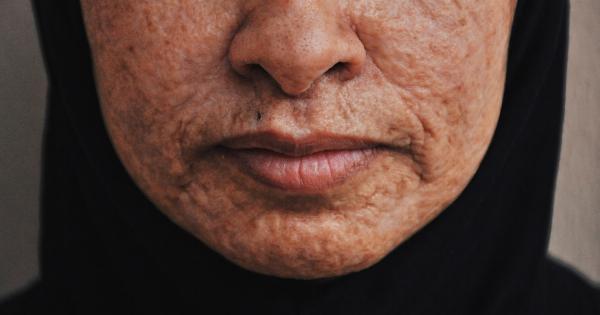Dealing with acne can be a frustrating experience, but even after the acne disappears, it can leave behind unsightly scars on your skin.
Acne scars can affect your confidence and self-esteem, making it important to find effective ways to minimize their appearance. Fortunately, there are several methods and natural remedies that can help fade acne scars over time. In this article, we will explore various techniques and treatments to help you get rid of acne scars.
1. Proper Skincare Routine
The first step to effectively treat acne scars is to establish a proper skincare routine. Follow these tips:.
Cleanse: Use a gentle cleanser to wash your face twice a day. Avoid harsh soaps or cleansers that can irritate the skin.
Exfoliate: Regular exfoliation helps remove dead skin cells, allowing new skin to regenerate. Use a gentle exfoliating scrub or a chemical exfoliant, such as salicylic acid.
Moisturize: Choose a non-comedogenic moisturizer to keep your skin hydrated without clogging pores.
Sun Protection: Always apply sunscreen with at least SPF 30 before going outdoors. Sun exposure can darken acne scars and make them more noticeable.
2. Microneedling
Microneedling is a minimally invasive procedure that involves puncturing the skin with tiny needles to stimulate collagen production. Collagen helps repair and regenerate the skin, reducing the appearance of acne scars.
It is recommended to have this procedure done by a professional dermatologist or aesthetician.
3. Chemical Peels
Chemical peels involve applying a solution to the skin to exfoliate the top layers. This helps improve the texture and appearance of the skin by reducing the appearance of acne scars.
Different types of peels are available, including glycolic acid, salicylic acid, and lactic acid peels. It is best to consult with a dermatologist to determine the most suitable peel for your skin type and scar severity.
4. Laser Therapy
Laser therapy is a popular treatment for reducing the appearance of acne scars. It involves using high-intensity light to address various skin concerns, including scars.
Laser therapy can stimulate collagen production and help resurface the skin, resulting in smoother and more even-toned skin. This procedure should be performed by a trained dermatologist or a certified laser technician.
5. Retinoids
Retinoids, derived from vitamin A, can be applied topically to fade acne scars. They work by promoting cell turnover and stimulating collagen production. Over time, retinoids can smoothen the skin’s texture and improve the appearance of scars.
Consult with a dermatologist to choose the appropriate retinoid strength and formulation for your skin.
6. Natural Remedies
While there is limited scientific evidence to support their effectiveness, some natural remedies may help fade acne scars:.
Aloe Vera: Apply pure aloe vera gel to the scars and leave it on for 30 minutes before rinsing off. Aloe vera has soothing properties and may promote skin healing.
Coconut Oil: Massage virgin coconut oil onto the scars in circular motions. Coconut oil contains antioxidants and moisturizing properties that may help fade scars.
Lemon Juice: Dilute fresh lemon juice with water and apply it to the scars using a cotton ball. Lemon juice contains citric acid, which may lighten the appearance of scars.
Apple Cider Vinegar: Mix equal parts of apple cider vinegar and water. Apply the solution to the scars using a cotton ball. Apple cider vinegar has exfoliating properties that may help reduce the appearance of scars.
Honey: Apply raw honey to the scars and leave it on for 10-15 minutes before rinsing off. Honey has antibacterial properties and may help with scar healing.
7. Silicone Gel Sheets
Silicone gel sheets or patches can be applied directly to acne scars. These sheets create a protective barrier over the scar, helping to retain moisture and improve the scar’s appearance over time.
They are widely available over the counter and can be easily incorporated into your skincare routine.
8. Corticosteroid Injections
Corticosteroid injections are primarily used for raised or keloid acne scars. Injections containing a corticosteroid are directly administered into the scar tissue, reducing inflammation and flattening the scar.
This procedure should be performed by a dermatologist or a healthcare professional.
9. Dermal Fillers
Dermal fillers, such as hyaluronic acid, can be injected into pitted acne scars to restore volume and create a smoother skin surface.
The effects are temporary and may require multiple sessions, but fillers can significantly improve the appearance of deep acne scars. Consult with a dermatologist to discuss the best options for your specific scar type.
10. Camouflage Makeup
If you want to minimize the appearance of acne scars temporarily, camouflage makeup can be a great solution. Opt for products specifically designed to cover scars, as they provide better coverage and longer-lasting results.
Look for makeup labeled as “non-comedogenic” to avoid clogging pores and causing further breakouts.
Remember, treating acne scars takes time and consistency. Results may vary based on the type and severity of your acne scars.
It is always best to consult with a dermatologist or skincare professional before trying any treatments to ensure they are suitable for your skin type and condition.































